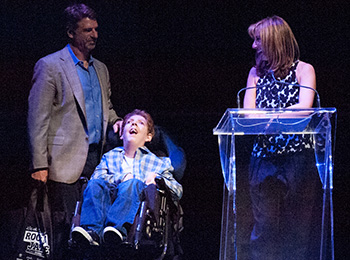TORONTO — Eighteen-year-olds often receive concert tickets for their birthday, but last month, Jacob Schwartz was given a full concert to mark the milestone. And despite his not playing a lick, the event took his nickname: Jake’s Jam.
By now, eponymy is standard for Jacob. First came Jacob’s Ladder, the organization that started it all. Then, Jake’s Gigantic Give – which also featured Jake’s Lounge – added a twist on charitable giving. Finally, last Wednesday’s partygoers departed with swag including Jake’s Jammies, complete with lettering sewn on the pants.
Jacob’s atypical life began early. At four months, he was diagnosed with the neurological condition Canavan disease. The group that bears Jacob’s name was launched by his parents, Ellen and Jeff, to raise money and awareness for Canavan and seven other diseases that are more common among Ashkenazi Jews than among other groups.
“We were initially told that Jacob would not live to his fifth birthday,” Ellen Schwartz said, “so the fact that he’s turning 18 is a miracle in itself… We’re grateful for every day we have Jacob, so we celebrate every day.”
About 700 people attended the sold-out birthday party-fundraiser at Toronto’s Panasonic Theatre. The event, the 20th organized by Jacob’s Ladder, raised $100,000 and was hosted by Mark Breslin, founder of Yuk Yuk’s comedy clubs.
Music, though, animated the evening – as it does Jacob’s life. He can’t see, move or speak, but he can hear. Most of all, said Schwartz, he hears the music.
“I didn’t announce who was coming [to perform],” she said, “because I wanted the audience to experience music the way Jake does: feel it, live in the moment, feel the music.”
For the family, the importance of song goes back to Jacob’s darkest days. At the age of two, he came out of a medically induced coma at music’s beckoning.
“Kayla [Goren, a popular children’s entertainer] came down to the hospital to play the guitar for him and he smiled,” Schwartz said, “so music brought him out of his coma. He just loves, loves, loves music … His eyes just widen up, and it’s as if they’re dancing. He’s unable to speak, but a smile comes across his face and you just see how he’s feeling the music. So that was the inspiration for this concert.”
Venue aside, Jake’s Jam evoked the chord-laden Schwartz living room. Jacob had previously met all the performers, except for Breslin. Among them: actress and musician Jackie Richardson; singer-songwriters Amy Sky and Hayden Desser; various performers from the under-18 set; a group from the Etobicoke School of the Arts, and family members including Jacob’s brother, Ben, 12, and sister, Bevvy, 15. Jacob Hoggard, lead singer of contemporary headliners Hedley, also recorded a personalized performance, which was played at the event.
Over its 17-year history, Jacob’s Ladder, the Canadian Foundation for Control of Neurodegenerative Disease, has raised $2.5 million. In addition to its educational and research initiatives, the group covered the cost of free screening for eight “Jewish” neurological diseases before the provincial government began its financial support.
Jake’s Jam will alleviate a funding crunch for older individuals with severe special needs.
“As Jacob gets older,” Schwartz said, “I’ve learned that after-21 programming is very difficult for lots of families. Right now [before 21], children with special needs go to school, they’re part of a routine, they have somewhere to go every day. But when they turn 21, it stops.”
Before age 21, parents have a choice of costly private or free public programs. Government funding ends with a child’s 21st birthday.
Existing after-21 programs have wait lists that can be up to seven years, with some children dying before being accepted. For those who gain entry, the fees for service are a burden for parents, who often already face trying home situations.
“A lot of parents with children with disabilities are single parents,” Schwartz said, “so they can’t afford programming. I’m hearing that lots of parents have to quit their jobs because they become full-time caregivers.”
Schwartz has not decided which programs to support – though she is “very, very impressed” by some – but she will fund, not create.
“I don’t want to recreate the wheel here,” she said. “I want to help fund existing programs, expand them so other families can join in.”
